The Bengal cat makes a wonderful pet that will reward pet owners with affection, attention, and companionship. However, the breed requires a lot of investment in time, effort, and of course, money. The Bengal is an expensive cat breed.
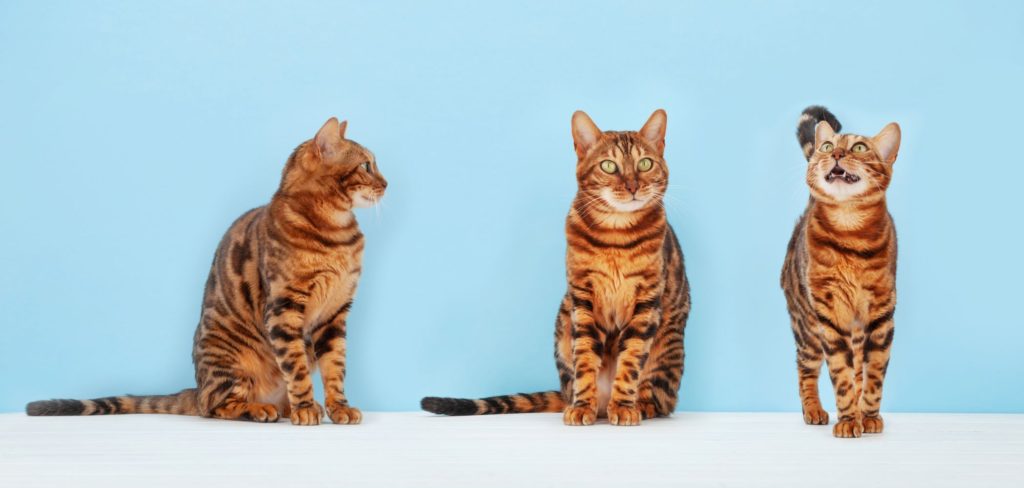
Therefore, before you adopt or buy a Bengal to bring into your new home, it is essential to know how much it actually costs to keep this cat breed as a pet. After all, the adoption fees or the purchase price is not the only cost to consider, and it’s also a good idea to think about the cost of your pet’s daily care, such as food costs, medical expenses, and so on.
This guide will cover all these costs in detail. Here’s the exact breakdown of how much a Bengal costs with additional numbers on how much it might cost over its lifetime.
Bengal Cats: Quick Overview
A healthy male Bengal cat weighs around 10-12 lb (4.5 – 5.5 kg) and measures around 8-10 inches at withers. The females are slightly smaller and lighter.
They are known for their exotic look reminiscent of other wild cats. Temperament-wise, the Bengal is affectionate, friendly, bold, and social. It is a highly energetic and intelligent breed which makes them a very dynamic cat to have.
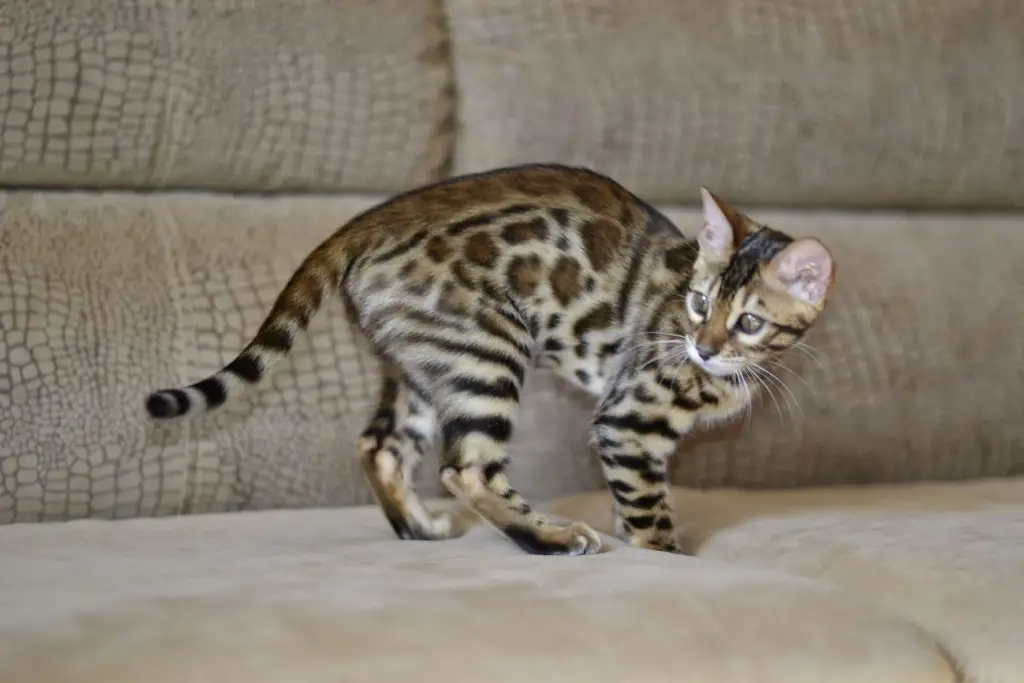
All these characteristics have increased the Bengal cat’s popularity, and it is little wonder that the breed is typically in the top 20 of the most popular cat breeds. Naturally, this popularity comes at a price, and its higher demand has led breeders to charge a premium for Bengal kittens.
We also mustn’t forget the Bengals’ rare ancestry. These cats have been bred from the Asian Leopard cat and domesticated cats, making them quite rare and relatively new as far as domestic cats are concerned. These factors too make them rather expensive!
So How Much Does a Bengal Cat Cost?
A purebred Bengal kitty companion from reputable Bengal cat breeders can cost almost $1500 to $3000. For a pedigreed Show or Breeder quality Bengal cat, the costs can be over $4000. Additionally, some breeders may charge more for kittens depending on their effort into the breeding program. Adopting a Bengal can cost you, on average, around $400.
The medical costs for most Bengal cats can come to $500 in the first year, as they include neutering/spaying and vaccinations. You’d also spend around $50-$100 per month on its food and treats. Annually, most Bengal owners spend about $600 to $1000 on their pets.
Bengal Cat Price: Adopting VS Buying From a Breeder
| Method of Obtaining a Bengal Cat | Price Range |
|---|---|
| Show Breeder Quality Bengal Cat from a Reputable Breeder | Over $4000 – $5000 |
| Show Quality Bengal Cat from a Reputable Breeder | Over $4000 |
| Pet Quality Bengal Cat from a Reputable Breeder | $1500 – $3000 |
| Adopting a Bengal Cat From a Shelter | $200 – $400 |
Adopting a Bengal Cat From a Shelter
Adopting a Bengal cat is usually much cheaper than buying a purebred one from a breeder. Most adoption centers charge an adoption fee between $200 and $400 for Bengal cats. Some cover the spaying/neutering of the cat for an extra fee.
Most shelters and rescue homes also cover the initial vaccinations, deworming, and license fees. Based on these services, you can expect to pay anywhere between $200 and $400 for adopting your rescue Bengal. Additionally, because the Bengal cat breed is a high demand, the shelter may require pet owners to have experience with cats and thus, may price the Bengal a little bit higher than other cats in the shelter.
Another thing to note is that the cat’s age can vary from very young to very old when adopting from a shelter. Bengal cats that show up in the cat shelters are usually adult cats or senior Bengal cats. Older Bengal cats are generally more mellow and better behaved than their younger counterparts!
Buying a Bengal Cat From a Breeder
Reputed breeders charge different amounts for their litters, and these prices mainly depend on the amount of effort they have put in. Sometimes, breeders have to pay stud fees or ‘borrow’ champion male cats from another breeder.
Often, breeders conduct health checks on their cats before mating. They get their cats checked for joint and eye issues and refrain from breeding cats with a predisposition to these issues. These veterinary costs are also factored into the kitten’s price.
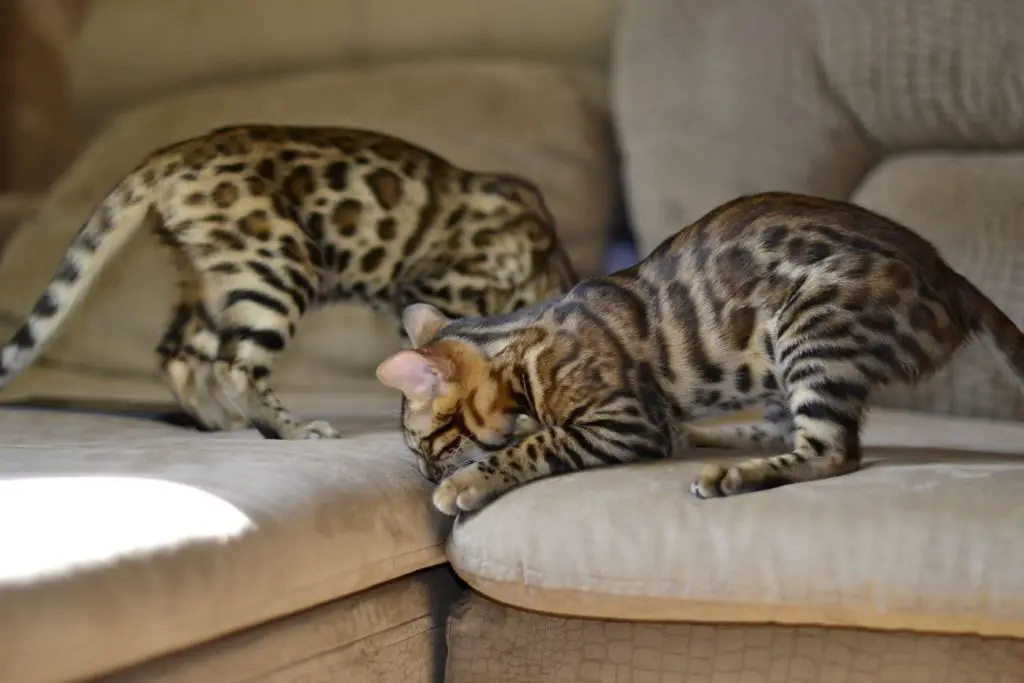
Additionally, a good breeder will also do genetic testing and screening to minimize any health issues that are carried over (such as hypertrophic cardiomyopathy, see below). Although it’s important to note that no genetic tests are validated in hybrid breeds such as the Bengal cat thus, accuracy is not completely known.
Here’s an example list of the things included in a Bengal kitten’s price from a popular cattery located in the United States:
- Health records from the Vet
- Core vaccinations
- De-worming
- Favorite toys
- Bag of food that the kitten is used to
- T.I.C.A. Registration Paperwork
- One year signed genetic health guarantee
- Lifetime support
Important Notes About Bengal Breeders
Not all Bengal breeders are of the same breeder quality, and there are different breeders out there, and you should know the pros and cons of interacting with each one. There are two types of breeders that you’ll usually encounter:
- T.I.C.A. (The International Cat Association) Registered Bengal breeder
- A backyard Bengal breeder
For a quick summary, T.I.C.A. registered breeders have ethical rules that all members must sign and follow. These rules ensure the breeding programs are following ethical breeding guidelines to protect the animals in addition to protecting the rights of the sellers and buyers. Potential pet owners should be aware of the risk when purchasing a kitten from a Bengal breeder that doesn’t have T.I.C.A. papers.
Are all backyard breeders bad and not responsible breeders? No, but because they don’t operate on any set rules or guidelines, just be aware that the experience of buying your Bengal cat can vary vastly from different breeders.
| Bengal Breeder Type | Pros | Cons |
|---|---|---|
| T.I.C.A. Registered Bengal Breeder | – Bengal kittens are healthy with no known genetic concerns. – Has T.I.C.A. paperwork to prove the ancestry and guarantees the kitten purebred. – Guarantees social temperament and personality. – Great buying experience with many included perks such as lifetime support. | – Expensive – Long process to go through |
| Backyard Bengal Breeder | – Bengal cats are lower in price and more economically appealing. – Quick to process. | – No benefits and no support after purchase – Higher chance of your cat being sick or ill. |
To find ethical and reputable breeders registered at The International Cat Association, click here.
General Process & Costs of Getting a Bengal Kitten From a Breeder
If you’re going to obtain your Bengal cat from a Breeder, remember there’s a process, and it can take some time and money before the Bengal kitten actually arrives at your home.
Here’s what you should expect:
- Filling out and getting onto a wait list. Usually, a cattery will have appoximately 10 kittens go to their respective homes a month. Therefore, depending on the quality of Bengal you want and the popularity of the cattery, you may have to wait a couple of months.
- If you want a breeder (Bengals meant for a breeding program) quality Bengal cat, it will be the most expensive at over $4000 but you’ll get the cat faster as you’ll get first pick of the litter. Usually this takes about 1-2 months. Typically there’s also a refundable deposit of around $1000.
- A show quality (a Bengal meant to be in shows and competitions) Bengal cat will be similar in price at around $3000 – $4000. The typical wait time is about 1-2 months. Typically, there’s also a refundable deposit of around $1000.
- Pet quality Bengal cats are lower price at approximately $2000 but has a longer wait time of around 2-4 months. Also, usually includes a non-refundable deposit of $200 – $500 depending on the cattery.
Factors That Affect a Bengal Cat/Kitten’s Price
As mentioned above, most breeders charge an average price of $2000 for their purebred Bengal cat kitties, and some breeders may even set a hefty price tag of $4000 or more for show quality Bengals.
Here are some factors that determine the price of a Bengal cat.
Price Differences in Bengal Cats Based on Coat Color & Patterns
Bengals are available in a range of coat colors and patterns. Silver, brown, black, white, or snow are the most common colors. Some have patterns that include tiger stripes or spottings like cheetahs or marble-like streaks.
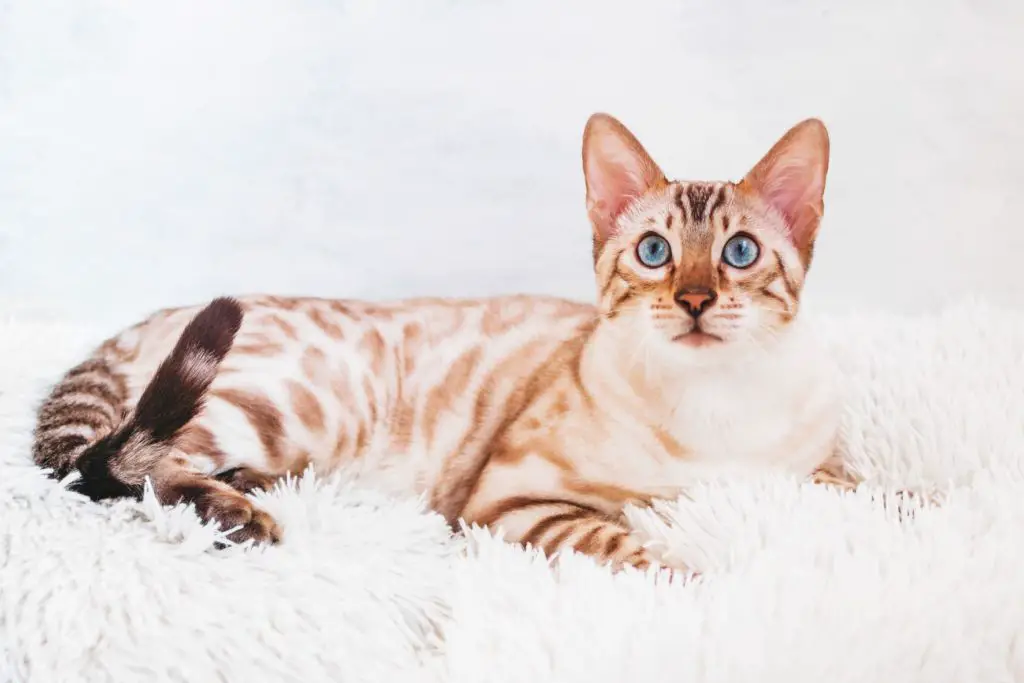
The accepted coat colors for show-variety cats are brown, snow, and silver. Naturally, these kittens are priced higher. Here is a table showing the price of Bengals based on their coat colors/patterns:
| Bengal Cat Coat Color | Cost of a Bengal Cat |
|---|---|
| Silver-Spotted Bengal Cat | Up to $2800 |
| Snow Sepia Bengal Cat | Up to $2600 |
| Charcoal Rosetted Bengal | Up to $2500 |
| Mink-Spotted Bengal | Up to $2500 |
| Brown Marbled Bengal | Up to $2000 |
Age and Quality of The Bengal Cat
The age of your Bengal kitten and the purpose behind ownership are some other factors that increase a cat’s price. Breeders charge heavily for show quality cats or cats that will be used for breeding compared to pet quality kittens or cats. Also, the younger the cat, the higher the price since kittens are usually in greater demand.
What is a show-quality Bengal cat or kitten? A show-quality Bengal kitten has all the desired traits that meet the “breed standard” closely. More specifically, according to the Cat Fancier’s Association, a breed standard Bengal cat will have the following general traits:
- Medium to large cat with a sleek, muscular build
- Hinquarters slightly higher than shoulders
- Tail is thick, with rounded tip, and carried lower than the back
- Has an expressive nocturnal look with exceptional markings to give a wild appearance
- Short, soft, luxurious and preferably glittered
For each coat color and pattern of the Bengal cat, there are also different guidelines and standards to be met.
Is There a Waiting List for Bengal Cats?
Most breeders do have lengthy waiting lists for their Bengal litters. Usually, these waiting lists can range from 1 month to 5 months, depending on the quality of the Bengal kitten.
This is a good sign, and it shows that the breeder is in great demand. Waitlists also ensure that you will get the exact kitten you want in terms of appearance and temperament. In fact, it is important that the breeder you select uses waitlists, and it will show you their professionalism and also their quality of breeding.
Bengal Cat Veterinary Costs
A part of owning any animal is keeping them healthy. Minimizing health issues is also why it is important to buy your cat from a reputed breeder. It also plays a part in keeping vet bills down since a healthy cat will require fewer visits, medication, and other procedures than a sick or injured cat.
Over your pet’s lifetime, which is around 12-16 years, you’d need to visit the vet for several routine examinations. Most vets charge between $40 to $100 a visit, but some may charge more for special cases.
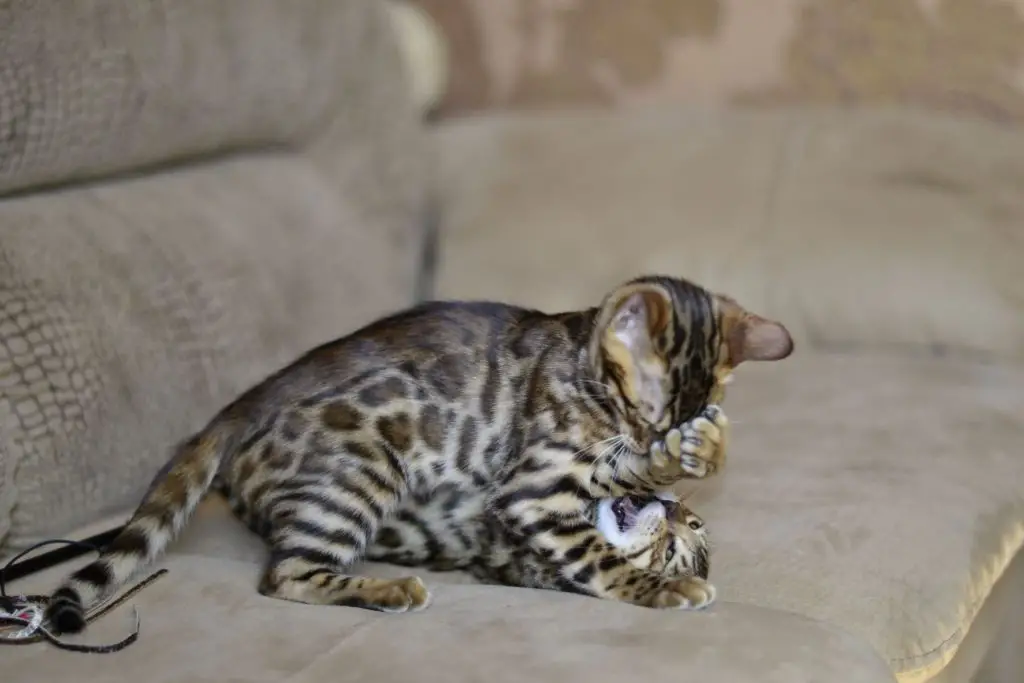
In your Bengal cat’s first year, it is best to get it de-sexed. De-sexing surgery can prevent certain cancers and behavioral issues like escaping, territory marking, etc. Spaying/neutering surgery can cost between $160 and $200 depending on the procedure, your city, etc.
Your Bengal will also need several vaccinations to prevent contagious feline diseases like Feline Viral Rhinotracheitis, Calicivirus, and Panleukopenia (F.V.R.C.P.). Most vaccines cost between $20 to $40 per shot. Your kitty will also need booster shots based on the schedule your vet provides.
Here is a table showing the approximate costs for vaccines and the age of the kitten to administer them:
| Age of Bengal Kitten | Name of Vaccine | Cost |
|---|---|---|
| 6-7 Weeks of Age | F.V.R.C.P. combo vaccine round 1 | $35 |
| 10 Weeks of Age | F.V.R.C.P. combo vaccine round 2 | $35 |
| 12 Weeks of Age | Rabies | $20 |
| 13 Weeks of Age | F.V.R.C.P. round 3 and Feline Leukemia vaccine round 1 | $35 + $34 |
| 16 Weeks of Age | F.V.R.C.P. round 4 and Feline Leukemia vaccine round 2 | $35 + $34 |
Other Medical Costs For Bengal Cats
Your Bengal could also need certain other medical costs that can include the following:
- Physical exam – $45 to $55
- Blood tests – $80-$200
- Hospitalization – $200 to $1000 per night
- Emergency surgery – $2000 to $5000.
Bengal cats are bold, energetic, and persistent cats. Therefore, accidents happen. Make sure to take the time to prevent accidents and injuries by Bengal-proofing your home!
Common Health Issues in Bengal Cats
Bengals are generally a healthy breed, but some common issues are known to pop up in them from time to time:
- Hypertrophic Cardiomyopathy (HCM). Thickening of the heart’s walls which makes it more difficult for the heart to pump blood efficiently. This disease affects all domestic cats, not just Bengal cats.
The cost of treating HCM can be very expensive. Initial workups for a cat with HCM costs approximately $500 – $1,000. If the cat requires hospitalization, costs will be higher.
- FLUTD. This is a feline lower urinary tract disease. Many factors can cause it, including stress. Urinary stones caused by poor diets can also be a factor.
The cost of treating FLUTD in cats is between $100 and $200 and surgery can cost almost $2000. - Kidney Disease. Prolonged dehydration caused by dry cat food is one of the factors of kidney disease. Blockages, poison, trauma, and other infections can also lead to renal failure in cats.
The cost of treating it is almost $650 per year.
Costs of Basic Supplies For Bengal Cats
Before you bring home your kitten from the breeder or adult cat from a shelter, it is important to stock up on some basic supplies. These will make your cat’s life comfortable and help it feel more welcome in the new environment.
| Bengal Cat Supplies | Cost |
|---|---|
| Food and Treats | $20 – $100 |
| Bowls | $20 – $50 |
| Carrier | $25 – $50 |
| Cat Scratching Post | $18 – $50 |
| Toys | $50 – $75 |
| Litter Boxes and Litter | $15 – $200 |
Notes:
- Food costs. Ask the breeder/shelter for the brand of food so that you can feed the same to your kitty. This is important to avoid digestive issues. If your vet recommends a new brand of food, make the change slowly.
- Feeding and water bowls. Select sturdy feeding bowls that won’t tip over or skid and frighten your kitty. You’d need at least two bowls for food and one for water.
- Litter and litter boxes. In most large houses you would need to place at least 2 litter boxes per cat. If you live in a multi-storied house, place one litter box on each floor. However, for smaller houses and apartments, one litter box is sufficient.
- Cat carrier. Those trips to the vet will be much easier if you have a cat carrier.
- Cat scratchers & cat trees. A proper cat scratching post will be sturdy, tall, and provide good resistance to sharpen their claws. More importantly, it’ll save your furniture from being scratched. Again, Bengal cats are notorious for being bold and energetic, therefore, getting a cat tree or cat pole for them to climb and play will help them develop into more well-rounded cats.
- Cat furniture. Create a safe and cozy place for your Bengal to rest and perch. Many cats frequently change their sleeping areas so you may have to buy several pieces of furniture to catify your home.
- Cat toys. Bengal cats are notorious for their unending amounts of energy. Tire out and stimulate your Bengal kitty mentally, prevent boredom, and also reduce behavioral issues.
Miscellaneous Costs of Owning a Bengal Cat
In addition to food and medical costs, there are certain miscellaneous costs that Bengal owners need to be aware of:
- Travel. If you travel by air with your cat, the cost of airfare can be around $150 to $300 oneway. You also need to buy/rent a special air carrier.
- Pet boarding. In case you choose to leave your pet at a pet hotel, these facilities usually charge around $30-$50 per night.
- Pet sitting. Cat sitters charge almost $30-$50 per day depending on the services.
- Pet deposit fees. If you leave in a rented house, landlords may charge around $200 as a one-time non-refundable deposit fee to cover any potential damage. Check out how to prevent damage and costs related to damage here!
Summary: How Much Do Bengal Cats Cost?
A purebred Bengal cat from a reputed breeder can cost around $1500 to $3000, and some breeders may charge more for specific coat colors and bloodlines. Adopting a rescued Bengal is cheaper – about $200 to $400.
Medical costs for a Bengal cat can come to $500 in the first year, including vaccinations and spaying/neutering. Food and treats can cost around $60 per month, and the cost of basic supplies (one-time cost) is about $100-$500. Pet insurance for most cats is around $350 per year.
Bengal cats live for an average of 12-16 years. On average, most Bengal owners spend around $750 per year on their pets. So, the average lifetime expense of owning a Bengal can be between $9000 and $15,000.
These are just estimates, and the actual costs will vary based on your style of cat parenting as well as the city you live in. I hope this guide helps you plan financially for your Bengal Cat.

Do Bengal cats wander?? Our previous cat used our walled back garden to go to the toilet and never ventured off our property- wouldn’t want to limit this energetic cat if indoor life is it’s only option